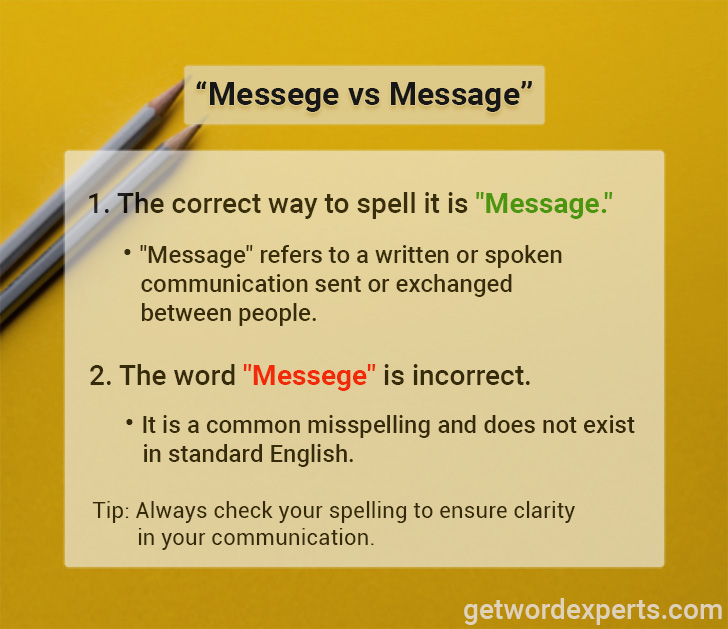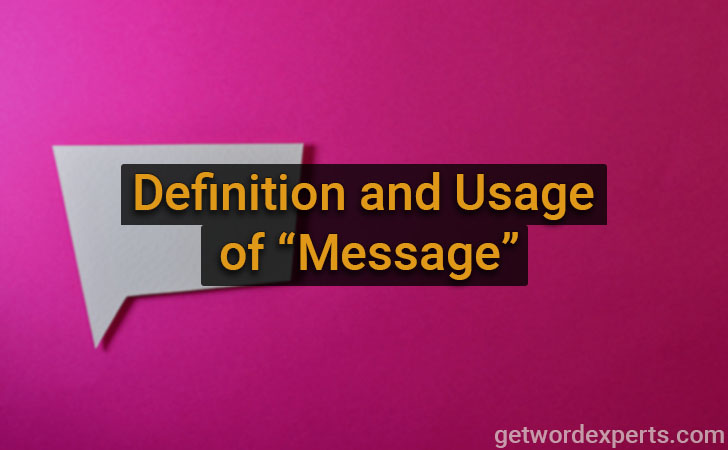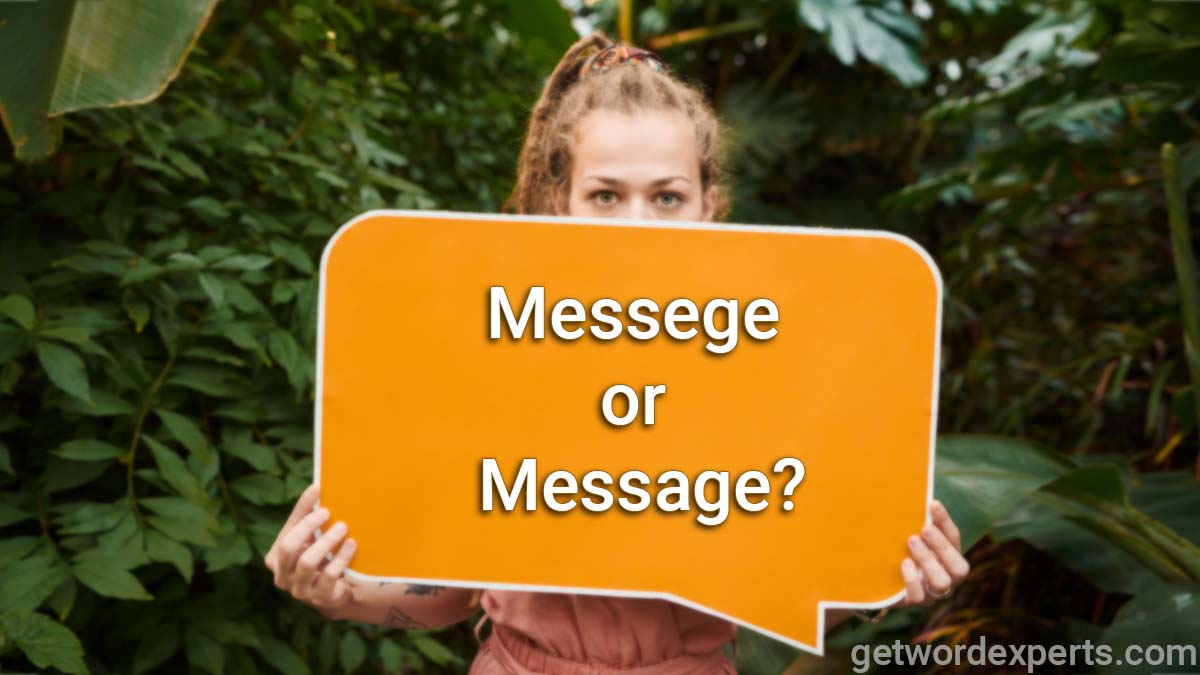Have you ever paused mid-sentence, unsure whether to write “messege or message”? It happens more often than you might think, especially in today’s fast-paced digital world. Think about it: You’re sending a quick text or drafting an email, and your fingers type “messege” instead of “message” without even realizing it. This simple mistake can create confusion or even make you appear careless, particularly in professional settings. Let’s unravel this common error together and make sure you’re spelling it right every time.
The Correct Spelling: Messege or Message?

The word you’re looking for is “message.” The term “messege” is a misspelling and does not exist in standard English.
- Message: Refers to information conveyed from one person to another, either verbally or in writing.
- Messege: A common error, likely caused by phonetic spelling or typographical mistakes.
Definition and Usage of “Message”

The term “message” has several meanings. It can refer to a simple piece of information shared between individuals. It may also describe broader communication meant to convey thoughts or emotions. It is defined as any form of information transmitted, whether verbal, written, or digital. In various contexts—personal, professional, and technological—the term “message” takes on different meanings, as shown in the examples below.
- Communication: A piece of information sent from one person to another.
- Example: “I left a message on your voicemail.”
- Digital Context: Refers to texts, emails, or instant messages.
- Example: “He sent me a message on WhatsApp.”
- Symbolic Meaning: Sometimes, “message” can mean an underlying moral or theme.
- Example: “The message conveyed in the story is the importance of always being kind.”
Common Causes of the Spelling Error
Spelling “messege” instead of “message” often stems from a few key reasons:
- Typographical Errors: When typing quickly, it’s easy to swap letters or hit the wrong key, especially since “S” and “A” are close on a keyboard.
- Phonetic Confusion: Some people spell words as they sound, and the pronunciation of “message” might mislead them to write “messege.”
- Texting Habits: Casual communication in texting often encourages shortcuts, leading to reinforced incorrect spellings.
Common Mistakes with “Messege or Message” Usage
Using “message” correctly in sentences helps ensure clear and effective communication. Whether in personal conversations or professional settings, the term can be applied in various ways. Below are a few examples demonstrating the correct usage of ‘message’:
- Correct: “Could you forward the message to the team?”
- Incorrect: “I recieved your messege earlier today.”
- Correct: “Can you please deliver this message to the team before the meeting?”
- Correct: “The message was clear—everyone needs to complete the task by Friday
- Incorrect: “She didn’t reply to my messege yesterday.”
- Incorrect: “Can you send the massege again? I didn’t get it.”
Proper spelling ensures your communication is clear and professional, leaving no room for misinterpretation.
Message as a Noun
The word “message” is often used as a noun, referring to any form of communication intended to convey information, emotions, instructions, or requests between individuals or groups. This can be in verbal, written, or digital forms, all serving as a means to communicate.
Message as a Noun
| Definition | Examples | Synonyms |
|---|---|---|
| A piece of communication intended to inform, instruct, or express emotions. | “She left me a message about the meeting.” | Note, communication, announcement |
| A written or spoken statement. | “I received a message from the client this morning.” | Statement, memo, notification |
| A brief or urgent communication. | “Please read the message on the board.” | Bulletin, dispatch, letter |
Message as a Verb
When used as a verb, “message” refers to the action of sending or delivering a message. It can apply in both informal and formal contexts, often relating to texting, emailing, or leaving a note for someone.
Message as a Verb
| Definition | Examples | Synonyms |
|---|---|---|
| To send or communicate a message to someone. | “I will message you the details later.” | Text, notify, inform |
| To leave a message for someone. | “Can you message me when you arrive?” | Contact, write, communicate |
| To convey information through a medium. | “She messaged him with the important updates.” | Send, alert, reach out |
Impact of Spelling Errors
Making spelling mistakes like “messege” instead of “message” might seem minor, but it can have larger implications:
- Professionalism: In emails or documents, errors can make you appear less detail-oriented.
- Clarity: Misspelled words can confuse your audience and dilute your message.
- Credibility: Frequent errors might make others question your expertise or attention to detail.
Tips to Avoid This Common Mistake (Messege or Message)
- Use Spell-Check Tools: Take advantage of built-in tools in word processors and email applications.
- Proofread Carefully: Always read over your work before hitting send.
- Practice Writing: Write the correct spelling multiple times to reinforce it in your memory.
Commonly Misspelled Words like “messege vs message”
Mistakes like “messege” vs. “message” aren’t isolated incidents. In fact, they’re part of a broader pattern of everyday errors people make when writing quickly or relying on phonetics. Words like “definately” (instead of “definitely”) or “seperate” (instead of “separate”) slip through even in professional writing. These examples show how small misspellings can have a bigger impact than we realize.

- “Definately” vs “Definitely”
- “Seperate” vs “Separate”
- “Recieve” vs “Receive”
You might also like to read about: “Thanks for the Heads Up” Meaning & Practical Usage With Examples.
Etymology of “Message”
The word “message” originates from Old French “message,” which stems from the Latin “missaticum,” meaning something sent. Over centuries, it evolved to signify communication in various forms.
Fun Facts About the Word “Message”
- The word “message” became a cornerstone of communication in the 20th century with the rise of telegraphy, telephony, and, later, digital communication.
- Famous usage: “The medium is the message,” a famous quote by Marshall McLuhan, highlights the significance of how information is delivered.
Conclusion
The distinction between ‘messege or message’ might seem trivial, but accurate spelling is essential for effective communication. By understanding the correct use of ‘message’ and its meaning, you can convey your thoughts clearly and professionally. Double-checking your writing will help you avoid common errors like mixing up ‘messege or message’ every time.

